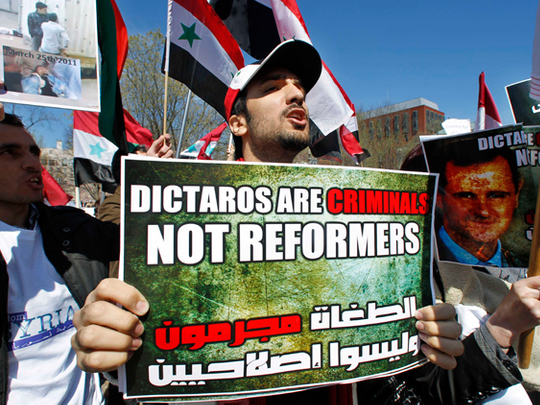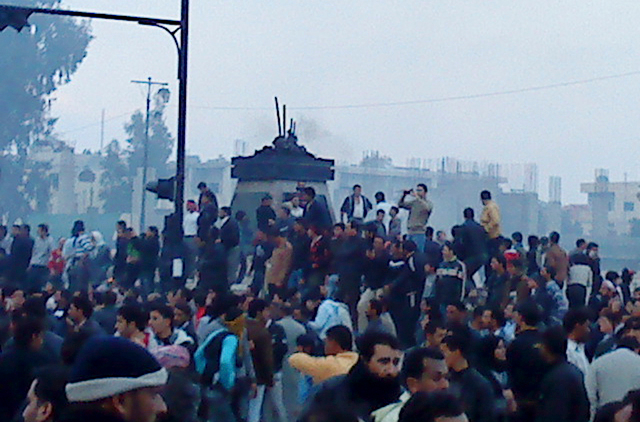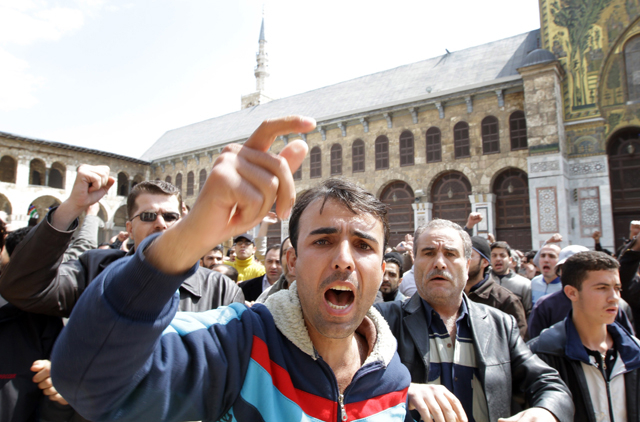
Dubai: President Bashar Al Assad, who is facing unprecedented domestic pressure as protests and clashes erupt across Syria, will address the nation "very soon", his adviser told AFP on Sunday.
The Syrian government confirmed to Al Jazeera that the Emergency Law will be lifted.
"President Assad will address his people very soon to explain the situation and clarify and elaborate on the reforms that have already been decided," Buthaina Shaaban said.
More than 30 people have been confirmed killed in a spiral of violence that has gripped Syria since protests broke out on March 15, with demonstrators demanding reform.
Syrian troops on Sunday entered the northern city of Latakia where 12 people died in clashes.
A Syrian official said that those killed included 10 security forces and two gunmen.
"The army entered Latakia... to put an end to the destruction and the murders," the pro-government Al Watan newspaper reported.
Al Watan said two security services officers were killed on Saturday and 70 troops wounded in Latakia.
A high-ranking Syrian official said snipers had shot and killed two passers-by Saturday in the scenic port.
Activists and witnesses said that Syrian army units in army vehicles have deployed in key areas of the seaside Mediterranean city following a day of violence and chaos in which protesters and the government accused each other of violence and incitement. They spoke on Sunday on condition of anonymity for fear of reprisal.
The government on Saturday accused armed groups of attacking people in the religiously mixed resort city, adding at least two people were killed by rooftop snipers. Protesters accused government forces of opening fire on protesters.
Violence escalates
Six protesters were killed on Saturday in Latakia as violence escalated in Syria posing the greatest challenge to the 11-year rule of President Bashar Al Assad, reports said.
Thousands of mourners at the funeral of a person killed in protests burned a ruling Baath party building and a police station in Tafas on Saturday.
In nearby Daraa, a tribal town that is the epicentre of the protests, some 300 young men climbed on the rubble of a statue of the late president Hafez Al Assad, father of Bashar, raising anti-regime slogans, witnesses said.
Latakia, hometown of the late president, faced a second day of trouble. The government said that Palestinians from a nearby refugee camp marched to the city and killed three policemen.
Residents reported clashes between the people and security personnel.
Bouthaina Shaaban, political and media adviser to the president, told BBC Arabic TV that small groups of obscure background were trying to ignite sectarian strife.
She recalled the 1980 unrest in Syria which, according to her, started in Latakia when the Muslim Brotherhood killed a Sunni scholar followed by the killing of an Alawite scholar. The two incidents ignited an unrest in the country that lasted for three years during Hafez Al Assad's rule.
Shaaban said there are signs of external interference in Syria. "Five Lebanese were arrested in Homs, 200km north of the capital. An Algerian and an Egyptian were held in Damascus.
Prisoners freed
She said Syrians can protest peacefully and she was witness to President Bashar Al Assad's orders to the security not to fire on peaceful protesters. "What happened in the city of Sanameen on Friday, where the protesters say more than 50 were killed ... [the government puts the toll at 15], was that they stormed a police station and stole weapons. The group moved later to a military centre to storm it. The guard of the centre fired at the armed protesters and killed some of them."
Witnesses in Daraa told Gulf News that protesters are in control of the three security branches — Political Police Security, State Security and Military Security.
A human rights lawyer said that 260 prisoners, mostly Islamists, were freed after completing at least three-quarters of their sentences. Protesters have been demanding the release of political prisoners and the lifting of the emergency law.
— With additional inputs from agencies














